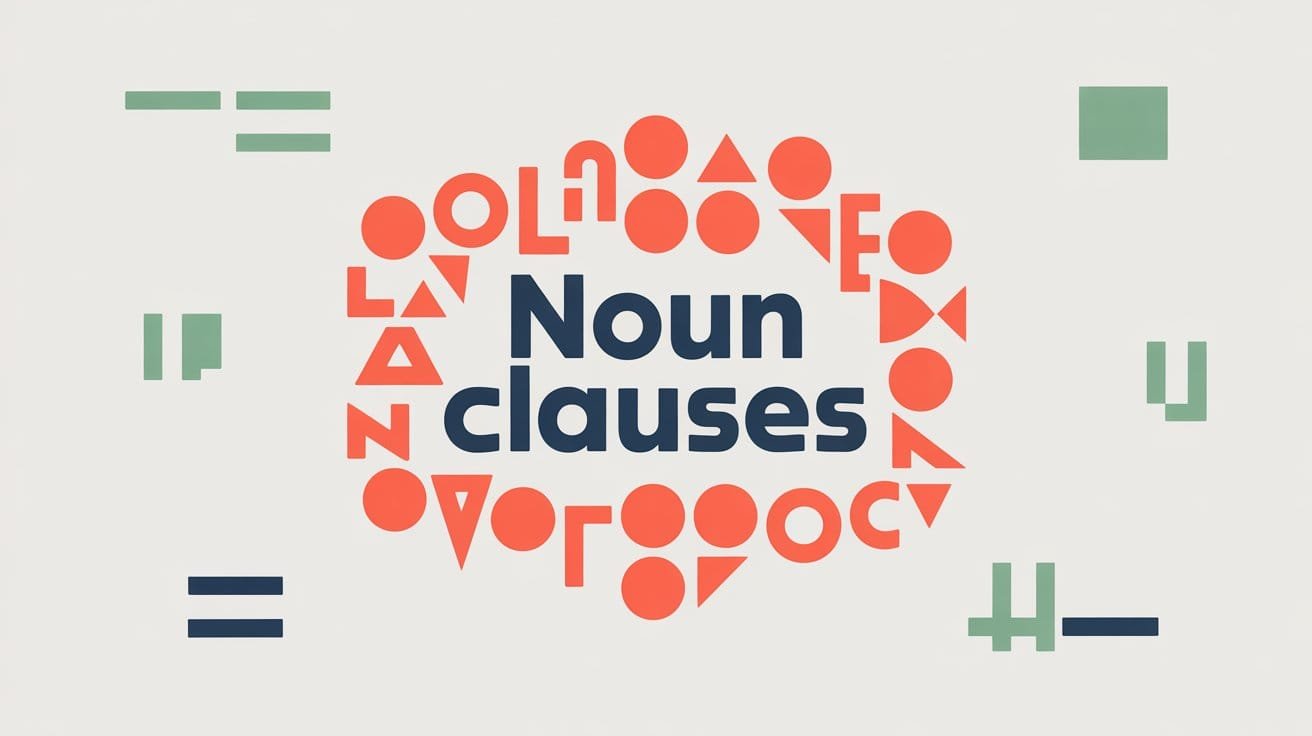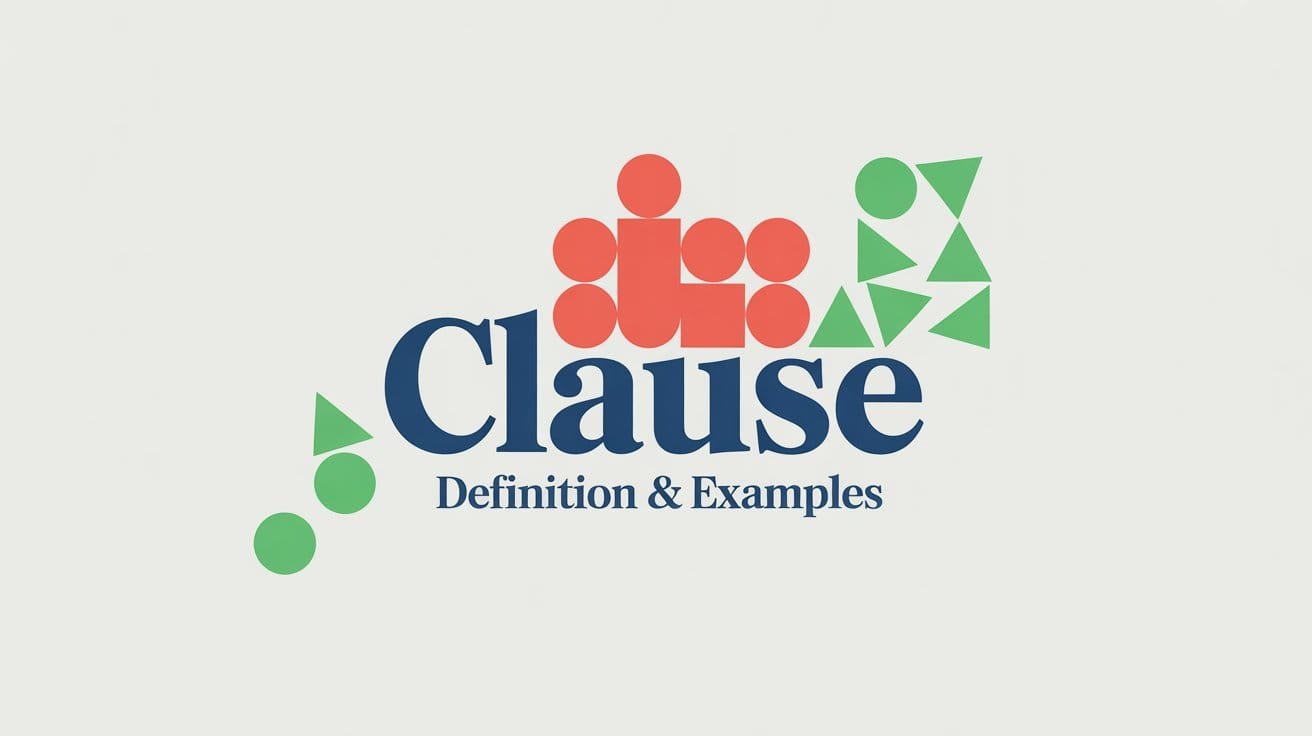In English, clauses can serve many roles, but when a clause functions like a noun, it’s called a noun clause. Noun clauses often answer questions like “what?” or “who?” and can appear anywhere a noun normally would: as the subject, object, or complement in a sentence.
This article explains what noun clauses are, how to spot them, and how to use them correctly with clear examples.
What Is a Noun Clause?
A noun clause is a group of words that includes a subject and a verb but functions as a noun in a sentence. It cannot stand alone and must be part of a larger sentence to make sense.
Because it acts like a noun, a noun clause can appear where a noun normally would, such as the subject of a sentence or the object of a verb.
Consider this example:
Why the schedule changed remains unclear.
Here, Why the schedule changed is the subject of the sentence.
Another example:
The teacher explained how photosynthesis works.
In this case, how photosynthesis works is the object of the verb explained.
Noun clauses often begin with words like what, how, that, why, or whether. They’re dependent clauses, which means they can’t stand alone, but they complete the meaning of the sentence they’re part of.
Functions of Noun Clauses
Noun clauses can take on different roles in a sentence, just like a single noun would. Their placement depends on how they’re being used. Here are the main ways noun clauses function:
1. As the Subject of a Sentence
When a noun clause acts as the subject, it appears at the beginning and tells what the sentence is about.
- What the committee proposed still needs approval.
- Whether we get the grant depends on the next review.
2. As the Direct Object
A noun clause can serve as the direct object of a verb, answering what or who in relation to the action.
- The coach explained why the practice was canceled.
- She didn’t mention that the deadline had changed.
3. As the Indirect Object
Sometimes, a noun clause appears as the indirect object, usually after verbs like give, offer, or show.
- They offered whoever was interested a chance to join.
- He showed whoever asked the correct steps.
4. As the Object of a Preposition
A noun clause can complete a prepositional phrase when placed after a preposition.
- We talked about what the survey revealed.
- She’s focused on how the solution can be applied.
5. As a Subject Complement (Predicate Nominative)
Noun clauses also appear after linking verbs (like is, seems, or was) and rename or define the subject.
- The point is that we need more time.
- His belief is that honesty matters most.
How to Identify Noun Clauses
Noun clauses often begin with specific words that signal their role in the sentence. These introductory words include:
- That
- What, whatever
- Who, whoever, whom, whomever
- Which, whichever
- How, when, where, why, whether, if
These words may also appear in other types of clauses, so it’s important to look at how the clause functions in the sentence.
Tip: Replace the Clause with a Noun
If you can replace the group of words with a noun and the sentence still makes sense, you’re likely dealing with a noun clause.
Example:
That the power went out was unexpected.
→ Try replacing with a noun: The outage was unexpected. ✔
The sentence still works, so the clause is functioning as a noun.
More Examples
- What she wears to interviews matters.
(Subject of the sentence) - I’m not sure whether they received the email.
(Direct object of sure) - He’s proud of how far his team has come.
(Object of the preposition of)
When reading a sentence, ask yourself: “Is this group of words acting like a person, place, thing, or idea?” If yes, and it contains a subject and a verb, it’s likely a noun clause.
Examples of Noun Clauses in Sentences
Below are examples of noun clauses used in different parts of a sentence. Each one includes a subject and a verb, yet functions as a single noun.
Noun Clause As Subject
- What Carla suggested was accepted without changes.
- Whether the policy will pass remains uncertain.
Noun Clause As Direct Object
- I finally understand why the experiment failed.
- She didn’t mention that the class was canceled.
Noun Clause As Indirect Object
- We offered whoever completed the form early access.
- The instructor showed whoever was unsure the process again.
Noun Clause As Object of a Preposition
- They debated over how the funds should be divided.
- He has no control over what happens next.
Noun Clause As Subject Complement
- The reality is that we’re running out of time.
- His explanation was that the data wasn’t complete.
These examples show how noun clauses fit into everyday writing. They carry meaning just like a noun would, but allow for more complex and detailed expression.
Noun Clauses vs. Other Clauses
Noun clauses can sometimes look similar to adjective or adverbial clauses, especially since they may begin with the same words. The difference lies in their function within the sentence.
Noun Clause
A noun clause acts like a noun and can be the subject, object, or complement.
- What he promised was never delivered. (Subject)
- She believed that the results were accurate. (Direct object)
Adjective Clause
An adjective clause describes a noun or pronoun. It often begins with who, which, or that and answers the question “which one?”
- The book that she recommended was insightful.
(That she recommended modifies book)
Adverbial Clause
An adverbial clause adds information about when, why, how, or under what condition something happens.
- We stayed inside because it was raining.
(Because it was raining explains why we stayed inside)
Quick Check:
Ask:
- Is it acting as a noun? → It’s a noun clause.
- Is it describing a noun? → It’s an adjective clause.
- Is it giving time, reason, or condition? → It’s an adverbial clause.
Noun Clause vs. Noun Phrase
Although noun clauses and noun phrases both perform the role of a noun in a sentence, they differ in structure and complexity.
A noun clause is a dependent clause that includes a subject and a verb but does not form a complete sentence on its own. It often begins with words like that, what, how, or whether, and it carries the function of a noun, such as acting as a subject or object.
In contrast, a noun phrase is much simpler. It does not contain a verb and is made up of a noun and its modifiers. A noun phrase may include articles, adjectives, possessives, or other descriptive words, but it won’t have a subject-verb combination.
The key distinction lies in the presence of a verb: noun clauses contain one; noun phrases do not. Recognizing this difference helps you understand how sentence parts function and vary in complexity.
Examples:
Noun Clause:
- What she submitted impressed the panel.
- I don’t know whether they will attend.
Noun Phrase:
- Her final submission impressed the panel.
- I don’t know the exact schedule.
In both sets, the clause and the phrase serve the same function, but their structure is clearly different.
FAQs About Noun Clauses
What is a noun clause in simple terms?
A noun clause is a group of words with a subject and a verb that works like a noun in a sentence. It can act as the subject, object, or complement, but it can’t stand alone as a complete sentence.
How can I identify a noun clause in a sentence?
Look for a group of words that answers a question like what, who, or why, and includes both a subject and a verb. If it fills the role of a noun and doesn’t make sense by itself, it’s likely a noun clause.
What’s the difference between a noun clause and a noun phrase?
A noun clause contains a subject and a verb, while a noun phrase does not. Both act like nouns, but a clause adds more detail because it forms a complete idea within the larger sentence.
Can a noun clause start with “that”?
Yes, many noun clauses begin with the word that. It often introduces a statement or belief, such as in: She said that the files were missing.
Why are noun clauses important in writing?
Noun clauses allow you to express more complex ideas in one sentence. They make it possible to include explanations, questions, or unknowns as part of a complete thought.



